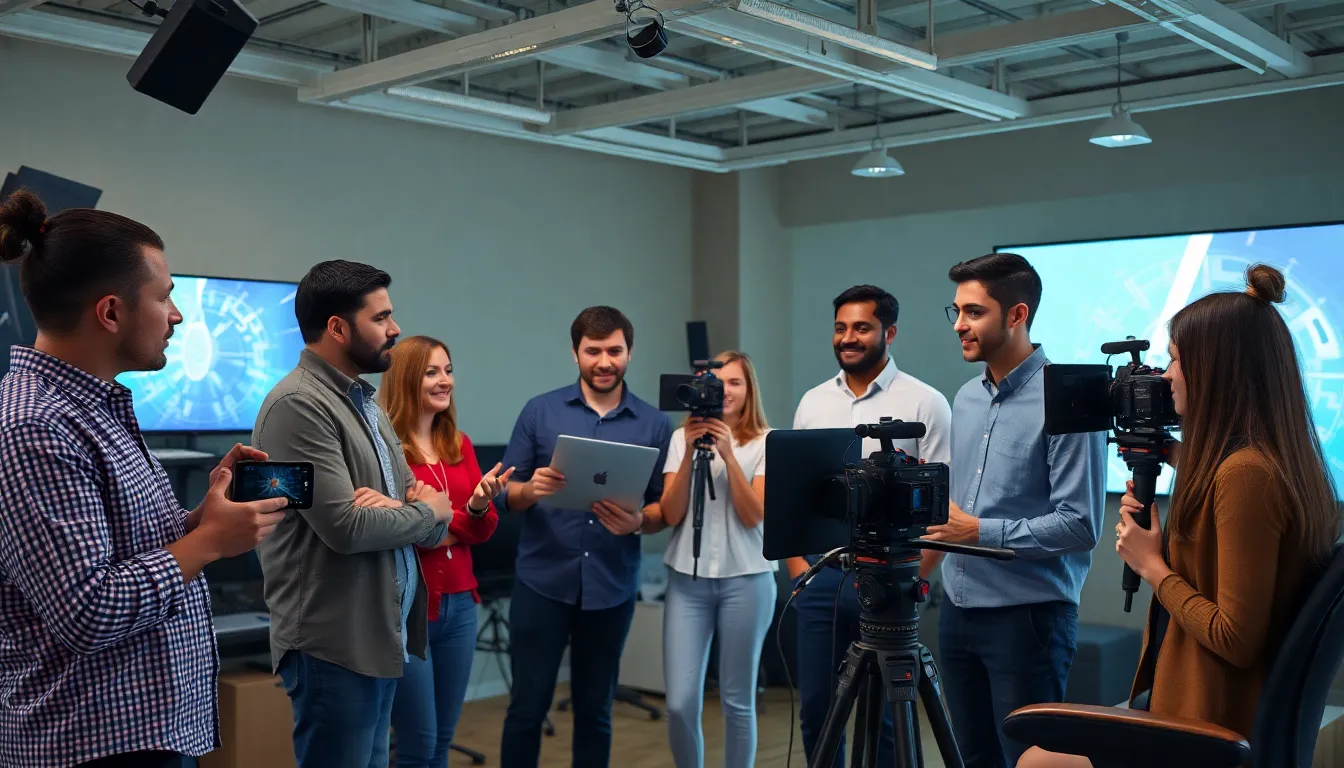Table of Contents
ToggleIn a world where robots might soon take over our day jobs and even our Netflix recommendations, artificial intelligence video is stepping into the spotlight. Imagine a world where AI crafts stunning visuals, edits with precision, and even writes scripts that could make Shakespeare raise an eyebrow. Sounds like a sci-fi movie, right? But it’s happening now, and it’s changing the way we create and consume content.
From marketing campaigns that practically sell themselves to personalized video experiences that make viewers feel like they’re the star, AI is revolutionizing the industry. It’s not just about flashy tech; it’s about efficiency, creativity, and maybe a little less time spent arguing with your editing software. Buckle up as we dive into the fascinating realm of artificial intelligence video and discover how it’s reshaping storytelling, one pixel at a time.
What Is Artificial Intelligence Video?
Artificial intelligence video refers to the use of AI technologies in creating, editing, and distributing video content. These technologies streamline various production processes, offering tools for automation and enhancement. Companies leverage AI for tasks such as video editing, where algorithms analyze footage and suggest cuts, transitions, and effects.
Optimization of content occurs when AI tools assess audience preferences and tailor videos accordingly. For example, AI can segment audiences based on viewing habits and demographics, ensuring a targeted approach to video marketing. With this tailored content, businesses can improve engagement rates and viewer satisfaction.
Scriptwriting benefits from AI advancements as well. Natural language processing enables AI to generate scripts that reflect audience interests and trends. Through machine learning, AI systems learn from previous successes, enhancing their ability to produce compelling narratives.
Furthermore, real-time analytics provide insights into viewer interactions. By monitoring metrics, AI adjusts content strategies, maximizing reach and effectiveness. This continuous feedback loop supports informed decision-making in video production.
AI also facilitates enhanced visuals through techniques like deepfake technology and generative adversarial networks. Creators utilize these methods to produce high-quality graphics and realistic animations. The results often lead to captivating storytelling experiences that blend reality and fiction.
In the realm of personalization, AI tailors content to individual preferences, creating unique viewer journeys. Personalized recommendations algorithms suggest relevant videos based on past viewing behavior, encouraging deeper engagement. This capability transforms how audiences discover and interact with video content.
Such innovations illustrate the significant transformation AI brings to video production, paving the way for more efficient and creative processes. Understanding these advancements highlights the ongoing impact of artificial intelligence on the industry.
Applications of Artificial Intelligence Video

Artificial intelligence video technology finds numerous applications across various sectors, showcasing its versatility and effectiveness in enhancing content creation.
In Film and Entertainment
AI plays a crucial role in film and entertainment by streamlining production workflows. Filmmakers utilize AI for script analysis, character development, and casting suggestions based on audience data. Visual effects rely heavily on AI algorithms for creating realistic animations and enhancing post-production processes. Automated tools assist editors in choosing optimal cuts by analyzing story pacing and visual continuity. These innovations allow creators to focus on storytelling while AI handles time-consuming tasks.
In Marketing and Advertising
Marketing and advertising leverage artificial intelligence video to target audiences more effectively. AI analyzes consumer behavior and preferences, providing insights that inform video content strategy. Personalized advertisements generated by AI can reach viewers based on demographics and interests, maximizing engagement rates. Dynamic video content adapts in real-time to viewer feedback, enhancing the overall user experience. Through these applications, companies increase their return on investment in video campaigns.
In Education
Artificial intelligence video transforms education by creating engaging learning materials. Educators utilize AI to develop customized video lessons that cater to individual learning styles. Interactive video content enhances user engagement and comprehension, prompting students to absorb information more effectively. Automatic transcription and translation features improve accessibility for diverse audiences. Through these innovations, educational institutions foster more inclusive and impactful learning environments.
Benefits of Artificial Intelligence Video
Artificial intelligence video technology offers several key advantages in various sectors, enhancing both creativity and efficiency.
Enhanced Creativity
AI tools revolutionize content creation by enabling innovative storytelling techniques. Through algorithms, it generates unique visuals and clever editing solutions, pushing the boundaries of traditional video production. Generative adversarial networks create lifelike images and videos that captivate audiences. Script generation improves narrative construction, ensuring stories resonate with viewers. AI assists creators by providing insights from data analysis, guiding direction and enhancing the creative process. With these capabilities, artistic boundaries expand, allowing for more dynamic and memorable content.
Improved Efficiency
Efficiency receives a significant boost through AI video technologies. Automation simplifies video editing processes, allowing for faster turnaround times. Algorithms analyze footage, suggesting optimal cuts and transitions that reduce the manual workload. Real-time analytics track viewer engagement, enabling rapid adjustments to improve content effectiveness. Marketers benefit from personalized video content tailored to specific demographics, maximizing target reach. Streamlined workflows translate to lower production costs and higher output quality. By optimizing these various aspects, AI enhances overall operational efficiency in video production environments.
Challenges and Ethical Considerations
Artificial intelligence video technology presents several challenges and ethical considerations. Data privacy remains a major concern, as AI tools often analyze vast amounts of personal information to tailor content. This analysis can lead to privacy breaches if proper safeguards aren’t in place.
Bias in algorithms also poses a significant risk. AI systems may inadvertently reflect the biases present in training data, resulting in unfair representation or exclusion of certain demographics in video content. Maintaining diversity and inclusion in AI-generated videos requires ongoing monitoring and adjustment.
Content authenticity faces scrutiny, particularly with deepfake technology that allows for realistic video alterations. Misuse of deepfake technology can lead to misinformation and manipulation of public opinion. Ensuring responsible usage of such powerful tools is paramount for maintaining trust in media.
Accountability becomes an important issue when AI creates content autonomously. Determining responsibility for the outcomes of AI-generated videos is complex, especially when errors or harmful content arise. Establishing clear lines of accountability is essential in navigating these challenges.
Intellectual property rights intersect with AI’s ability to generate original content. Questions about ownership and rights arise when AI produces material that resembles existing works. Addressing these intellectual property concerns requires clarity in legal frameworks as technology evolves.
Transparency in how AI algorithms operate also demands attention. Viewers benefit from understanding how algorithms influence content recommendations and choices. Increasing transparency fosters trust and encourages ethical usage of AI technologies.
Considering these challenges and ethical considerations is crucial for the responsible development and deployment of artificial intelligence in video production. Adopting best practices ensures that the benefits of AI are realized while minimizing potential risks.
Future of Artificial Intelligence Video
Future developments in artificial intelligence video promise to reshape content creation significantly. Enhanced algorithms will analyze viewer preferences more accurately, leading to even more personalized experiences. Automation continues to take center stage, streamlining workflows in video production industries worldwide.
Companies in film and marketing sectors are expected to adopt AI-driven tools increasingly to improve efficiency. AI can provide real-time feedback on viewer engagement, helping creators adapt content dynamically. Moreover, advancements in natural language processing will refine scriptwriting, allowing for more compelling narratives that resonate with diverse audiences.
Collaboration between AI technologies and human creativity is likely to create innovative storytelling techniques. The use of deepfake technology, while controversial, offers exciting possibilities for immersive experiences that captivate viewers. Businesses will harness AI to optimize advertisement placement, ensuring commercials align perfectly with audience interests.
Ethical considerations related to AI video technology may influence its future trajectory. Stakeholders will push for greater transparency in algorithms to ensure fair representation and mitigate bias. Data privacy concerns will prompt organizations to establish clearer guidelines, protecting user information while leveraging AI’s capabilities.
Furthermore, the need for accountability in AI-generated content will drive regulatory discussions. By addressing these ethical challenges, companies can cultivate trust and maintain a responsible approach to AI in video production. Continuous innovation will define the landscape, ensuring artificial intelligence becomes an integral component of future video content creation.
The integration of artificial intelligence in video production marks a transformative shift in the industry. As AI continues to enhance creativity and streamline workflows, it opens new avenues for storytelling and viewer engagement.
While the benefits are significant, addressing ethical concerns remains paramount. Issues like data privacy and algorithmic bias need careful consideration to ensure responsible use of AI technologies.
Looking ahead, the collaboration between AI and human creativity is poised to redefine content creation, making it more efficient and personalized. As advancements unfold, stakeholders must prioritize transparency and accountability to foster trust in this evolving landscape.



